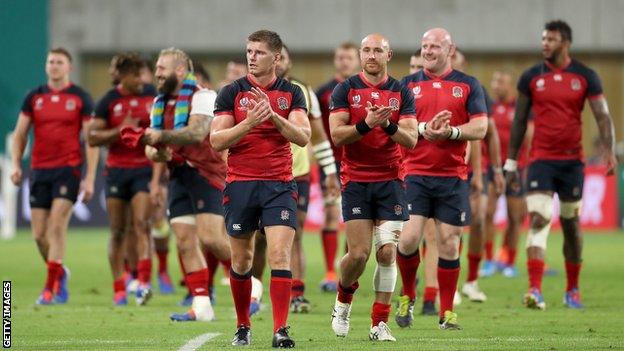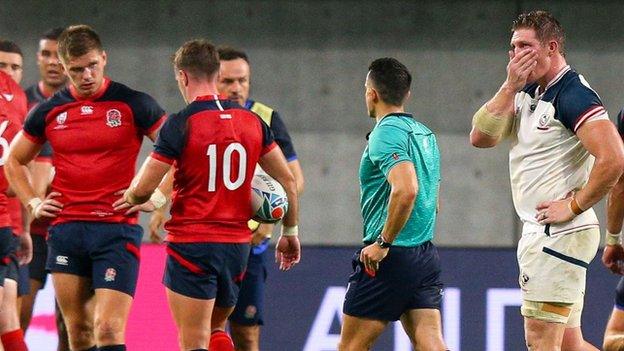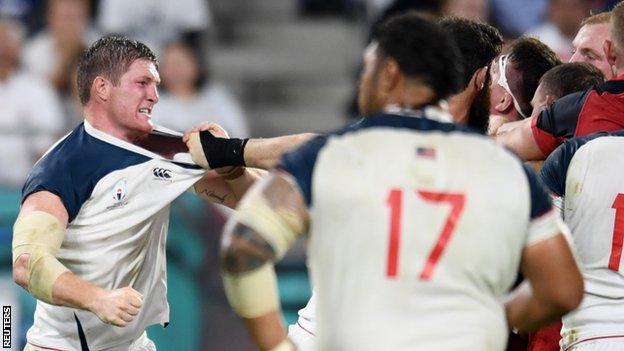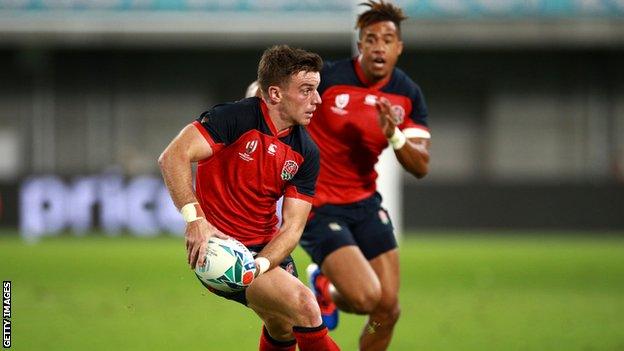Rugby World Cup: Owen Farrell standing up from John Quill tackle was England's main success
- Published
- comments

Owen Farrell remained on the pitch to finish the game after being on the receiving end of a shoulder charge from John Quill
You take the wins where you can in a World Cup. Tot up the tries and the points. Keep your key men fit. Keep the trajectory pointing up.
And so the stand-out success of England's time in Kobe, more so even than the seven tries and bonus-point win over an underwhelming USA side, may be that Owen Farrell stood up from a hit that on a crueller night could have ended very differently.
In an opening week defined by dangerous tackling and the officials' reaction to it, John Quill inked himself into US rugby history by becoming the first man from his nation to be sent off at a World Cup.
Shoulder to jaw, head following through, arms nowhere near. Farrell had blood on his nose before he hit the grass and was fortunate that he could jump up to attempt his own immediate retribution.
The same contact could have led to concussion or a broken jaw. Chokingly humid under the closed roof, a moment of brain-freeze and red mist.

Farrell (left) was lucky to escape with just a bloody nose after being felled by the red-carded Quill (right)
Farrell snarled it off afterwards, once the subsequent barney had blown itself out, but the reverberations will be felt across this tournament.
On the first weekend Australian winger Reece Hodge initially escaped censure for a similar hit on Fiji winger Peceli Yatu before his subsequent citing led to a three-game ban. Samoa's Rey Lee-Lo and Motu Matu'u could both have been sent off rather than sin-binned for high tackles on Russia's Vasily Artemyev.
After Thursday night Farrell's team-mate Piers Francis found himself the next case hauled in front of the disciplinary panel. Had his tackle on Will Hooley come 30 minutes into the game rather than three seconds it may have happened on the night.
The game of rugby is changing faster than the attitude of its players, which means a comfortable win for England is for now much more of a great escape than Eddie Jones may have imagined.

The England players (in red) were angered by the high tackle from Quill (left)
The plan was always to get through these two easier group games with his team tested but never exposed. Get everyone game-time but keep enough in reserve for what may follow, for if England are to win this World Cup they must now win five increasingly difficult matches in the space of five weeks.
Find the fluency that will give you a chance, test the combinations that could carry you on. Show a little of what you are about but not all the tricks and moves that might make the difference in a nail-biter rather than a breeze.
That is now 15 tries scored by England in their last three games. As importantly, it is one try conceded across the same period, and if the unavoidable caveat is that none of Italy, Tonga and the US are likely to feature in the knock-out stages, then Jones's team are showing an edge in places that he has wanted all along.
This win over the Eagles was built on raw power as much as soaring high. Jones was beaten in a World Cup final by an England team with a remorseless set-piece and the memory has formed the basis of his designs for his own version 16 years on.
The US could not cope with England's scrum and they could not cope with the driving mauls that followed scrum penalties kicked to the corners. When the front row had splintered them in the tight they then clattered them in the loose. When you see props Kyle Sinckler and Ellis Genge running and off-loading at pace it is to be reminded that the game is changing fast in more ways than one.
You try not to read too much into wins that everyone knew were coming but little hints and ideas come at you all the same.
George Ford, frozen out during the Six Nations, becoming the first England fly-half ever to score a try and assist another in a World Cup match, enjoying all the time and space afforded to him by his dominant pack but giving the impression that his old combination with Farrell might be trusted in the tougher tests to come.

George Ford captained England from fly-half as Farrell started the game on the bench
Jonathan Joseph, in the wilderness not that long ago, gliding and stepping in a way that would make him hard to drop even if Henry Slade were not struggling with injury.
Mark Wilson, coming off the bench for his first minutes at a World Cup and reminding everyone that a little old-fashioned wood-chopping in the back row can do a lot of damage; Lewis Ludlam, not even a regular starter at Northampton a year ago, rejected by the Saints academy aged 14, charging around on the biggest stage like a man expecting it all his life.
Jones is an old dog who likes teaching new kids. He can also see when punts are less likely to come off than he might have hoped.
Ruaridh McConnochie will be delighted to have bagged a World Cup try when no-one but Jones could have called him as a World Cup player two months ago. He also looked a little overwhelmed at times, which is to be expected but won't make it easier for a winger like Chris Ashton with 20 international tries and 40 caps to his name and only a place on the back-up list.
On the other wing, Joe Cokanasiga scored two but perversely made as strong a case for Jonny May as he did himself. In a World Cup where kicking from hand could be so critical he can still look uncertain under a high ball.
When that ball is tucked under his arm and he is travelling at pace he can scatter defenders like nine-pins. It's just getting him there in the space to do it. Then there is Willi Heinz, two penalties and a knock-on in the first 20 minutes as an understandable desire to impress occasionally spilled over into indiscretion.
The pace that Jones had promised, some of the execution. A fire in the eyes, enough coolness of touch for now. The trajectory going up, just as it has to.

